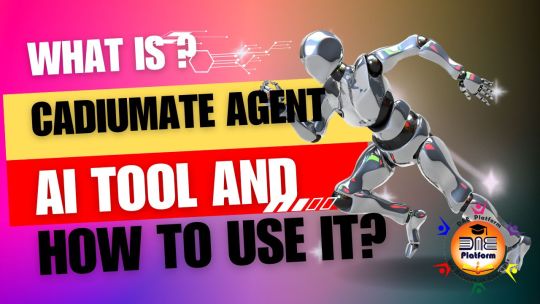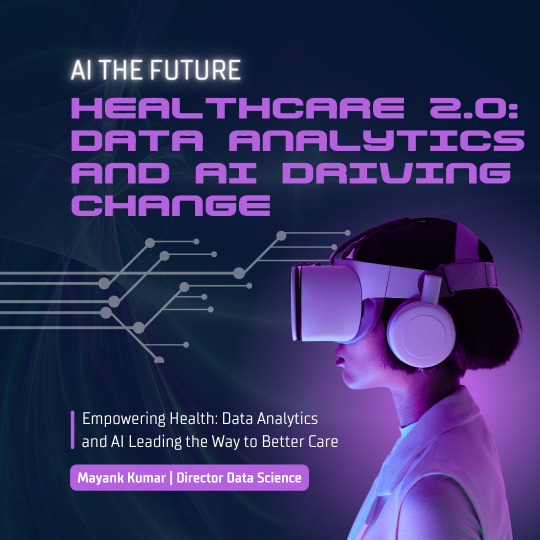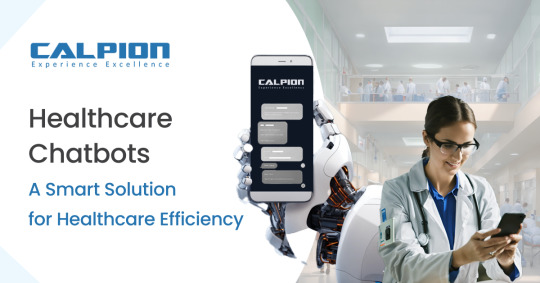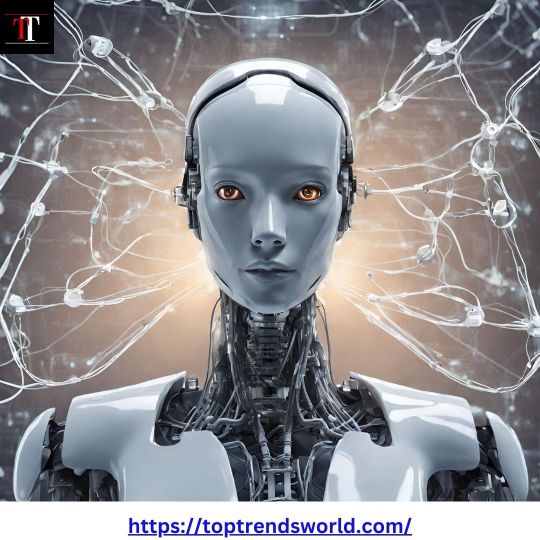#AIHealthcare
Text

Unlock the potential of AI in drug discovery and development! Explore the diverse range of AI technologies driving innovation in pharmaceuticals, from virtual screening to molecular modeling. Stay ahead in manufacturing with Softlabs Group, your source for the latest AI insights.
#Molecular Docking#DrugDiscoveryAI#AIinPharma#ArtificialIntelligenceDrugDevelopment#AIHealthcare#PharmaTechAI
0 notes
Text
Coding using AI on Codiumate Agent platform
Introduction
CodiumAI’s Codiumate Agent AI is an advanced artificial intelligence designed to assist users in coding-related tasks. It operates within an IDE, providing real-time support, error detection, and code optimization suggestions. The agent leverages deep learning algorithms to understand and generate code, making it an invaluable tool for developers looking to enhance productivity and…

View On WordPress
#AIAdoption#AIAnalytics#AIandSociety#AIApplications#AIChallenges#AIEducation#AIEmpowerment#AIEntertainment#AIExpertise#AIExploration#AIforGood#AIHealthcare#AIIndustry#AIInnovation#AIInsights#AIInspiration#AIJourney#AIProgress#AIUnleashed#AlImpact#ArtificialIntelligence#Automation#CuttingEdgeAI#DataScience#DigitalTransformation#EmergingTech#EthicalAI#FutureOfWork#FutureTech#HumanMachineCollaboration
0 notes
Text
#ai#ai tools#artificial intelligence#technology#mental health#mental illness#mental heath support#therapy#chatbots#wellness#mental wellness#emotional support#digital health#healthtech#anxietyawareness#aihealthcare
0 notes
Text

🧬💻 AI in Healthcare: Revolutionizing Patient Care! 🚑✨ Explore how artificial intelligence is transforming healthcare, from diagnostics and personalized medicine to streamlining administrative tasks! 🌐🤖 Here at Bsogood.com 🐝
0 notes
Text
AI-Powered Healthcare: Where Innovation Meets Compassion!
In this edition, we have with us Mayank Kumar, Director of Data Science at UnitedHealth Group, to talk about Analytics and AI within the Healthcare Industry and his journey so far.

1 note
·
View note
Text
Use Of ChatBots in Healthcare: The Rise Of Medical AI Chatbots
Microcode Software is leading the transformation in healthcare communications through its pioneering AI medical chatbots. These chatbots provide a crucial intermediary between patients and healthcare professionals by offering 24/7 support and prompt answers to questions about health. Powered by advanced natural language processing and machine learning technologies, they are adept at deciphering complex medical terms and responding to patient questions with precision. These capabilities facilitate a range of services, from symptom assessment and booking appointments to managing prescriptions, thereby improving patient engagement and contentment. Moreover, the chatbots are built on platforms that adhere to HIPAA standards, guaranteeing the confidentiality and security of patient information.

By lightening the load on healthcare workers and simplifying administrative operations, Microcode Software’s AI chatbots are making healthcare more efficient. This shift not only prioritizes quality patient care but also democratizes access to healthcare information, paving the way for a new era in digital health solutions.
Get More Information:
Contact us: +91-8882581143
Website: www.microcodesoftware.com
1 note
·
View note
Text
Healthcare Chatbots: A Smart Solution for Healthcare Efficiency

Undoubtedly, technology has changed our lives to an extent where information is available at the click of a mouse or tap on your phone. Google has been the first source of information for all our queries, and with AI integration - ChatGPT, with its latest versions, has adopted a form of search console as well.
When humans fall sick or need urgent assistance regarding their healthcare needs, it is only. Still, it is natural for us to google our symptoms and reach a conclusion; however, with automated bots ready with equipped information and speed of no other, it is a rather reliable solution that healthcare organizations would intend to adopt to their programs.
Chatbots are known for their reliability and quick answers in times of adversity when you need immediate assistance with tasks that do not necessarily involve human intervention. Our latest blog highlights the technological advancements of Chatbots and their role in increasing healthcare efficiency, with patient engagement as a major benefactor.
medical ai chatbots
Patient engagement is at the crux of every healthcare organization due to its increasing impact on patient retention. A healthcare chatbot can improve the patient's experience in various ways, such as making tasks easier for patient appointments, filling prescriptions, as an assistant, etc. Conversational chatbots are all the rage due to hyper-personalization, human-like conversation experience, and speed.
Some of the factors that drive the need for chatbots in healthcare are:
Patients
Providers
Insurance providers
Bots handle 70% of conversations and do not require human assistance, saving around 2.5 billion hours, which can be further utilized for better care and patient support chatbots.
Use Cases of AI Chatbots in Healthcare
Many people realize that adopting automation into their innovation strategy can be a game changer by cost-effectively improving operations throughout the organization, benefiting employees and patients. Embracing new technologies, such as robotic process automation with chatbots in healthcare, is crucial to achieving the interdependent goals of cost reduction and better patient care.
Appointment Scheduler: Patients can chat with chatbots to book appointments with their desired hospitals without waiting on calls or queues like in old times.
Patient Queries: AI chatbots can answer single and multiple queries by patients with a high response rate and accuracy.
Text Reminders/ IVR calls: Patient text reminders and IVR calls remind patients of their due dates of billing and appointments so there are no-shows or loss of collection for the providers.
Diagnostic Chatbots: Preliminary symptoms can be diagnosed using medical picture analysis. Medical AI chatbots can assist patients in better understanding their conditions, making efforts to adhere to prescribed regimens, and following up with healthcare physicians.
Patient Billing Chatbots: With Chatbots as patient engagement software, clinicians may easily contact patients and remind them of their monthly statements through E-statements and text reminders.
A/R calling bots, often known as accounts receivable chatbots, are automated systems that collect outstanding customer payments. Businesses utilize them to automate repetitive tasks like reminder calls, payment schedules, and negotiations.
Remote Monitoring Assistants: Once a patient has completed their medical consultation and is concerned about the side effects, chatbots are utilized to follow up via remote monitoring patient support with a polite conversation. These bots even provide updates on their sessions, lab results, symptom checks, and future progress. These interactions enable patients to quickly resolve their questions and alleviate worry, thus improving their experience.
Advantages of Healthcare Chatbots
Healthcare chatbots that apply the use cases above give providers numerous cost and time savings benefits and a competitive advantage. By 2027, chatbots in healthcare are expected to become the major channel for customer service in one-quarter of enterprises.
24/7 Availability
Data-driven Insights
Resource Allocation
Patient Engagement
Overall cost reduction
Streamline Operations & Increase ROI
Patient Satisfaction
Reducing workforce via automation
How to Successfully Implement a Healthcare Chatbot
The growth of AI and Machine Learning algorithms makes AI chatbot training and implementation easier, resulting in better healthcare outcomes. Statistics indicate that aural and visual features will be merged in the future. This technology encourages organic interactions, boosts user engagement, and makes chatbots in healthcare more accessible. However, enterprises must take specific procedures before installing a chatbot, and Calpion Inc. is your go-to tech bot.
Calpion Inc. provides its complete support with the implementation, management, and deployment of a healthcare chatbot in all its stages via the following steps:
Define your chatbot purpose.
Choosing the right model with the customized model
Regulatory Compliance of HIPAA compliance and SOC-certified.
Map your Patient Journey
Train & improve your Chatbot.
Integrate within existing systems.
Conclusion
Calpion Inc. consistently deploys, maintains, and manages the solutions to ensure flawless functionality while preserving operational efficiency. Healthcare firms may improve patient experience, staff efficiency, resource allocation, and service quality by tailoring chatbots to specific hospital bottlenecks and maximizing their impact.
If you're looking for an AI-powered chatbot or a customized model with unique business requirements, Calpion Inc. is here to solve your challenges. Contact Calpion to learn how our customized AI solutions have helped our healthcare clients improve their productivity, reduce patients waiting time by 1/10th, and enrich their patient experience.
0 notes
Text
Revolutionizing Conversations: Unveiling the Power of Artificial General Intelligence and Chatbot AI
Artificial intelligence, an introduction to the future, is evolving the way we communicate. Google images of artificial intelligence paint a vivid picture of innovation. Top AI companies spearhead this revolution, redefining the future of chat with unparalleled advancements. Amidst this tech upheaval, the spotlight shines on the game-changing Top AI Medical Software for Healthcare Professionals, promising efficiency in patient care. Witness the synergy of AI in healthcare, where conversations transform, setting the stage for a dynamic tomorrow. Explore the power, potential, and possibilities as AI reshapes our world and the future of healthcare conversations.

#AIRevolution#ChatbotInnovation#FutureOfChat#AGIpower#HealthTech#MedicalAI#TechInnovation#ConvoTransformation#AIHealthcare#GameChangingSoftware
0 notes
Text
The Impact of Artificial Intelligence on Healthcare
#AIHealthcare#HealthTech#AI#aihealthcare#ArtificialIntelligence#FutureofHealthcare#ImpactofAI#technology#healthcare#healthadvice#healthbenefits#websitedevelopment#websitedesign#softwaredeveloper#sdreatech
0 notes
Text

The Generative Power of AI in Healthcare
Generative artificial intelligence (AI) is the ability of artificial intelligence to produce new data that is comparable to existing data. This data may consist of text, images, and other types of data. Regenerative AI is being used in several fields, including healthcare. Thanks to its innovative solutions and revolutionary potential, generative AI has seen a noticeable surge in utilization in the healthcare industry.
Download-https://www.marketsandmarkets.com/industry-practice/RequestForm.asp?page=Generative%20AI
Important uses and advantages of generative AI in healthcare:
Drug Discovery and Development:
Molecule Generation: Using generative AI models to develop and produce novel molecules with desired properties helps expedite the drug discovery process.
Virtual Screening: Using AI-driven virtual screening of chemical compounds to identify potential drug candidates can save time and money.
Side Effect Prediction: Artificial intelligence models can assist in safety assessments by predicting potential side effects of new drugs.
Medical Imaging and Analysis:
Image Enhancement: Generative AI improves the quality of medical images, enabling more accurate diagnosis.
Image Segmentation: By dividing and recognizing areas of interest in medical images, AI can assist in the identification and planning of tumors.
Synthetic Data Generation: Artificial intelligence creates synthetic images of medical conditions to augment tiny datasets utilized for training machine learning models. Through the segmentation and identification of regions of interest in medical images, AI can assist in the diagnosis and planning of treatments for tumors.
Disease Diagnosis and Prediction:
Early Detection: Patient data can be evaluated to identify early disease indicators and plan appropriate therapy with the application of generative AI.
Diagnostic Support: AI-powered diagnostic tools help medical professionals by providing recommendations and insights based on patient data.
Pharmacogenomics: Artificial intelligence models predict how patients will react to specific therapies, which helps with drug selection.
Health Data Generation:
Synthetic Data for Privacy: Artificial intelligence generates artificial patient data for research and analysis purposes in order to protect patient confidentiality.
Electronic Health Records (EHRs):
Data Extraction and Summarization: AI can extract relevant data from electronic health records and summarize it to assist healthcare providers work more efficiently.
Generative AI in Healthcare
The use of generative AI has made it possible for those who live in rural areas or are unable to travel to conventional healthcare institutions to obtain healthcare treatments. Generative AI makes virtual patient consultations feasible. For this, other technologies like video conferencing can be employed. Virtual consultations allow patients to get the care they need without ever having to see a doctor. Telemedicine services can be rendered through the application of generative AI. This kind of healthcare delivery treats patients remotely by using telecommunications technologies. Numerous services, including consultations, diagnostic exams, and therapy, can be offered via telemedicine. Mobile health apps can be developed with generative AI. With the use of these apps, people can get access to healthcare services and information, including medication reminders, symptom monitoring, and links to medical professionals. Wearable technology can be developed using generative AI. These gadgets can be used to gather health-related data from patients, including blood pressure, blood sugar levels, and heart rate. This information can be used to track a patient's condition and give an early warning system for possible issues.
Challenges of generative AI in healthcare
Though there are many potential uses for generative AI in healthcare, there are also certain problems that need to be fixed. Some challenges facing generative AI in healthcare include the following:
Data availability: Generative AI techniques require large data sets to be trained. But it can be expensive and time-consuming to collect this data, especially in the healthcare sector. Since healthcare information is usually sensitive and confidential, patients may be reluctant to share it. Moreover, a practice known as siloing occurs when healthcare data is commonly stored in separate, hard-to-access platforms. Because of this, compiling and assembling data for training generative AI models is difficult. In order to solve the issue of data availability, healthcare institutions may try to collect and exchange data more efficiently. New methods of gathering data, such as crowdsourcing and wearable technology, can also be developed by them. Governments have the ability to support and fund research on the use of generative AI in healthcare.
Bias: Generative artificial intelligence algorithms run the risk of providing skewed data that isn't always representative of reality. This could lead to incorrect diagnosis and misdirected treatment plans. Bias may exist in the algorithm, the training set, or the algorithm's application. To get around the bias issue, generative artificial intelligence (AI) systems can be trained on a range of datasets. Moreover, adversarial training and debiasing are techniques to reduce bias in the algorithms. Healthcare organizations should also establish policies and procedures to ensure that generative AI algorithms are used equitably.
Regulation: In the healthcare industry, generative AI is still in its early stages of development and application, and its use is currently unregulated. This could give rise to safety concerns. Governments are able to enact rules governing the development and use of generative AI in the medical domain. These limitations can help to ensure that technology is used safely and morally.
Security: Generative AI algorithms may generate data that is harmful or inaccurate. Both medical personnel and patients may suffer as a result of this. To protect data from abuse or unauthorized access, security measures might be put in place. For example, encryption can protect data both at rest and in transit. Moreover, only authorized personnel may be able to access data.
Interpretability: Understanding the output of generative AI systems can be difficult. This means that it could be difficult to understand how the algorithms work and to confirm that they are generating accurate data. Improved interpretability of generative AI algorithms can be achieved by techniques such as explanation and visualization. This can increase the likelihood that people will understand how the algorithms work and will trust the results they produce.
Accuracy: Although generative AI systems are still in the early stages of development, their accuracy varies depending on the datasets they are trained on. This could lead to incorrect diagnosis and treatment. Generative AI systems can be made more accurate by strengthening them and using more and more diverse training datasets.
Acceptance: Since generative AI is still a relatively young technology, there may be considerable resistance to its application in the medical field. This is occurring because people may not trust the algorithms or may be concerned about the potential repercussions. Healthcare organizations have the ability to educate patients and providers about generative AI and its potential benefits. They can also establish policies and procedures to guarantee that technology is used ethically and safely.
Through the resolution of these problems, generative AI can aid in improving the effectiveness and efficiency of healthcare.
All things considered, generative AI is an innovative technology that has the potential to drastically alter the medical industry. However, there are still a few problems that need to be fixed before the technology is generally adopted. By addressing these problems, generative AI has the ability to improve patient care quality and raise the efficiency and equity of healthcare.
Future of Generative AI in Healthcare
The use of generative AI in medicine looks very promising. As technology develops, we should expect dramatic changes in the way we diagnose, treat, and prevent diseases.
AI Healthcare Technology
Artificial intelligence (AI) techniques and tools used in the medical and healthcare sectors are referred to as "AI Healthcare Technology". AI is being used in a wide range of applications to improve health condition diagnosis, treatment, monitoring, and management. Computer vision, natural language processing, machine learning algorithms, and other AI tools are widely used in AI healthcare technology to evaluate and comprehend medical data, predict outcomes, and assist healthcare providers in making decisions.
The following are common applications of AI in healthcare technology:
Medical imaging: AI that analyzes medical images like MRIs, CT scans, and X-rays can assist in the early identification and detection of conditions like cancer or fractures.
Electronic health records (EHR): Healthcare professionals can benefit from AI by using it to help organize and analyze patient data, which can improve clinical workflows and patient care.
Predictive analytics: Healthcare providers can avoid illness outbreaks, patient readmissions, and other patterns by using AI to predict them.
Drug discovery: Through the modeling of chemical interactions and the analysis of huge datasets, artificial intelligence can expedite the development of new medications.
Virtual health assistants: AI-enabled chatbots and virtual nurses can counsel, monitor, and help with chronic conditions.
Personalized treatment plans: By examining a patient's genetic, medical, and lifestyle information, AI can offer customized treatment regimens and medication recommendations.
Natural language processing (NLP): By collecting data from unstructured clinical notes and medical literature, artificial intelligence (AI) can support research and clinical decision-making.
Remote patient monitoring: AI has the potential to enable continuous patient monitoring for people with chronic illnesses, notifying medical personnel when a patient's status deteriorates.
Telemedicine: AI-powered remote medical diagnostic and consulting services are capable of producing better and more efficient outcomes.
AI in healthcare technology has the potential to improve patient outcomes, reduce costs, and boost the precision and effectiveness of healthcare delivery. Strict regulation, data security, and ethical and privacy concerns are also raised in order to protect patients' private information.
Read More - https://www.marketsandmarkets.com/industry-practice/GenerativeAI/genai-healthcare
#AIHealthcare#HealthTechRevolution#FutureOfMedicine#AIInHealth#Tech4Wellness#InnovationInHealthcare#MedTechAdvances#HealthcareAI
0 notes
Text

🔰RESHAPING HEATHCARE WITH A.I🤖
DMIHER IMMEC-CURTAIN RAISER
🏟️ VENUE : DATTA MEGHE MEDICAL COLLEGE NAGPUR
🗓️ Date : Saturday , 2nd December 2023
🔆 Click here to register: http://tinyurl.com/OrthoTV-RH-AI-2023
🔆 Speakers
👨⚕️Dr Koroush Kabir University of Cologne Germany 🇩🇪
👨⚕️Dr.Neeraj Bijlani Founder Ortho TV
👨⚕️Mr. Sachin Rathi Microsoft Asia Chief Singapore 🇸🇬
👩⚕️Dr.Aditi Chaudhary Ph.D Carnegie Mellon Google LLM Expert
👨⚕️Dr Sandeep Srivastava Director DMIHER Global
👨⚕️Dr Aashay Kekatpure Prof Orthopedics Surgery
👨⚕️Dr NandKishore Bankar Dean R& D
👨⚕️Dr Aditya Kekatpure Associate Prof Orthopedics
👨⚕️Dr Saurabh Srivastava Convenor R& D
👩⚕️Dr. Rajasi Sengupta IQAC Convenor
👩⚕️Dr. Anjali Borkar Incharge SVL Prof Anesthesia
❇️ Organising Secretary
Dr. Aashay kekatpure , Dr. Rajasi Sengupta , Dr.Nandkishore Bankar, Dr. Anjali Borkar &
Dr. Aditya Kekatpure
📺Media Partner : OrthoTV Global
🎥Streaming Live on OrthoTV
http://www.orthotvonline.com
♦️ Join OrthoTV : https://linktr.ee/OrthoTV
#HealthcareAI#AIinMedicine#MedicalInnovation#DMIHER#OrthoTV#MedicalConference#HealthTech#MedicalTechnology#AIHealthcare#HealthcareInnovation#DigitalHealth#HealthcareRevolution
0 notes
Text
Why is there a 30 degree phase shift at a power transformer?
Introduction
The 30-degree phase shift that is seen at a power transformer results from both the intrinsic design of the transformer and the electromagnetic principles that control its functioning. It is essential to comprehend the basic principles of transformer operation in order to comprehend this occurrence.
A transformer is made up of one or more primary and secondary windings, which are…

View On WordPress
#AIAdoption#AIAnalytics#AIandSociety#AIApplications#AIChallenges#AIEducation#AIEmpowerment#AIEntertainment#AIExpertise#AIExploration#AIforGood#AIHealthcare#AIIndustry#AIInnovation#AIInsights#AIInspiration#AIJourney#AIProgress#AIUnleashed#AlImpact#ArtificialIntelligence#Automation#CuttingEdgeAI#DataScience#DigitalTransformation#EmergingTech#EthicalAI#FutureOfWork#FutureTech#HumanMachineCollaboration
0 notes
Text
The Future is Here : Google & Microsoft's AI Health Systems Revealed | ai evolves
youtube
The Future of Healthcare Unveiled: Google and Microsoft's AI Systems Take Center Stage! 🚀🏥 Don't miss this incredible glimpse into the next-gen healthcare revolution.
#AIHealthcare#GoogleHealth#MicrosoftHealth#MedicalInnovation#HealthTech#AIRevolution#FutureOfMedicine#HealthcareTransformation#AIInMedicine#CuttingEdgeTech#Youtube
1 note
·
View note
Text
Code, Chemistry, and Cures
Pioneering the Pill Bottleneck
This week I am talking to Mati Gill (@matigill), Chief Executive Officer of AION Labs (@AionLabs), a first-of-its-kind alliance of global pharma and technology leaders and investors that have come together to create and adopt gateway AI and computational technologies that will transform the process of drug discovery and development for the betterment of human…

View On WordPress
#AI#AIforHealth#AIHealthcare#Artificial Intelligence#BioTechBreakthroughs#Communication#DrugDiscovery#FuturisticPharma#HealthTechRevolution#Incremental#Incremental Healthcare#IncrementalHealth#InnovativeHealthcare#Machine Learning#machine learning algorithms#MatiGillInterview#PharmaInnovation#TechMeetsMedicine#TheIncrementalist#Venture Capital
0 notes
Text

UAE artificial intelligence (AI) in healthcare market size at USD 119 million in 2022. During the forecast period between 2023 and 2029, BlueWeave expects the UAE artificial intelligence (AI) in healthcare market size to expand at a robust CAGR of 42.28% reaching a value of USD 987.6 million by 2029. Major growth drivers for the UAE artificial intelligence (AI) in healthcare market include rising investments in AI systems, a surge in demand for intelligent solutions for healthcare, and growing adoption of cloud technology. The UAE's healthcare system is renowned globally, with an impressive ratio of 181 doctors per 100,000 people. Approximately 85% of the UAE's population of 9.4 million consists of expatriates. Lifestyle diseases, like obesity (affecting one-third of adults) and diabetes (affecting one in five), are on the rise, prompting a demand for higher-quality healthcare services, particularly among the relatively affluent population. in recent years, the UAE has embraced AI in healthcare. Substantial investments by the government have facilitated an efficient healthcare system that leverages AI for improved medical services. AI-powered algorithms aid in precise and rapid disease diagnosis and treatment. Medical images and patient data in electronic health records are analyzed to identify patterns, allowing for personalized and effective treatments. AI is also employed in remote patient monitoring, enabling timely interventions. To drive innovation, the Dubai Health Authority (DHA) established the Dubai Health Innovation Centre, focused on testing and developing healthcare technologies, including AI solutions. Private companies, like Dubai-based startup Vezeeta, are also investing in AI-powered platforms to assist patients in finding doctors and booking appointments online. However, lack of skilled ai workforce and ambiguous regulatory guidelines for medical software are anticipated to restrain the overall market growth during the forecast period.
UAE Artificial intelligence (AI) in Healthcare Market – Overview
The UAE artificial intelligence (AI) in healthcare market refers to the sector's use and integration of AI technologies and solutions to enhance various aspects of healthcare services in the UAE. This includes the application of AI algorithms and machine learning (ML) techniques to analyze medical data, medical imaging, electronic health records, and other healthcare-related information to aid in diagnosis, treatment, personalized care, and decision-making processes. The market encompasses investments, developments, and adoption of AI-driven solutions aimed at improving the overall efficiency, accuracy, and quality of healthcare delivery in the UAE.
Sample Request @ https://www.blueweaveconsulting.com/report/uae-artificial-intelligence-in-healthcare-market/report-sample
0 notes